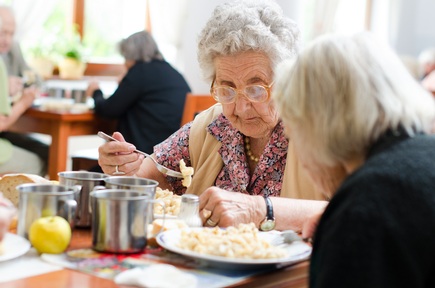Advice booklet launched to help prevent malnutrition and dehydration in older people
Care provider, Care UK has launched a new ‘Eat as we age’ booklet to help neighbours, family members, and care workers to support people who live alone and those who they suspect may not be eating properly.

The guide contains advice from care home chefs, managers and Care UK’s in-house dementia experts and has been launched following last month’s report by the Malnutrition Task Force, which revealed that more than one million older people could be at risk of malnutrition.
Head of care and clinical services for Care UK, Pauline Houchin has more than 30 years of experience providing care for older people. She commented: “There is so much coverage of the prevalence of obesity in our communities that it is easy to overlook the fact that many older people living in their own homes can be in danger of malnutrition. We see many people who, when they arrive at our care homes, are in a malnourished state – often because they’ve been living in their own home and dementia or their declining health means it has been hard for them to get access to nutritious meals.
“Apart from the obvious loss of weight, older people suffering from poor nutrition or hydration are more prone to pressure sores and urinary tract infections, find it much harder to recover from illness, infections or surgery, are more likely to have a fall and can often experience confusion.
“We often find that, once our chefs and carers have worked with new residents to get them properly nourished with plenty of fluids, their other conditions such as urinary tract infections or difficulty with walking can become less severe or even clear up altogether. I hope that by sharing our expertise with the wider community, we will be able to help people living in their own homes to avoid developing some of these conditions in the first place."
Research conducted by Care UK has further suggested that malnutrition is partially caused by poor mobility, while their latest report revealed that nearly one third of older people or those living with dementia are unable to cook for themselves and can’t reach or safely use their kitchen, while a similar number of people need help shopping for food.
The ‘Eating as we age’ guide contains useful information on how to overcome common problems associated with malnutrition, including: how to access meals without preparing them from scratch, restoring a person's interest in food and how to encourage those with a decreased appetite to eat and make every mouthful count.
Furthermore, the guide also contains advice on how to create environments that support older people to ‘dine with dignity’. The guide is full of practical tips on how to make meals contain more calories and nutrients, and how to treat cravings for salty or sweet foods which can be common for people with dementia.
Download the Eating as we age booklet here: http://www.careuk.com/care-homes/eating-as-we-age
Latest Innovative Care News
 13-May-19
'Pink drink' brain cancer treatment rolled out across NHS in memory of Baroness Jowell
13-May-19
'Pink drink' brain cancer treatment rolled out across NHS in memory of Baroness Jowell
 25-Apr-19
Louis Tomlinson helps 83-year-old who lost wife to dementia complete bucket list
25-Apr-19
Louis Tomlinson helps 83-year-old who lost wife to dementia complete bucket list
 05-Mar-19
Care worker of the year inspires nine-year-old son to work in care
05-Mar-19
Care worker of the year inspires nine-year-old son to work in care
 12-Feb-19
Michael McIntyre's jokes tested to see if they stop elderly catching flu
12-Feb-19
Michael McIntyre's jokes tested to see if they stop elderly catching flu
 25-Jan-19
Ninety-year-old and his dog can stay together, thanks to care worker
25-Jan-19
Ninety-year-old and his dog can stay together, thanks to care worker